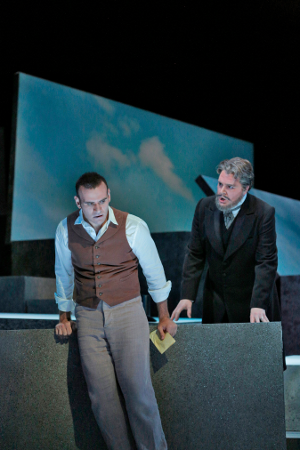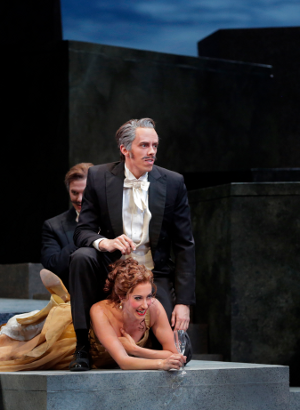Recently in Reviews
English Touring Opera are delighted to announce a season of lyric monodramas to tour nationally from October to December. The season features music for solo singer and piano by Argento, Britten, Tippett and Shostakovich with a bold and inventive approach to making opera during social distancing.
This tenth of ten Live from London concerts was in fact a recorded live performance from California. It was no less enjoyable for that, and it was also uplifting to learn that this wasn’t in fact the ‘last’ LfL event that we will be able to enjoy, courtesy of VOCES8 and their fellow vocal ensembles (more below …).
Ever since Wigmore Hall announced their superb series of autumn concerts, all streamed live and available free of charge, I’d been looking forward to this song recital by Ian Bostridge and Imogen Cooper.
The Sixteen continues its exploration of Henry Purcell’s Welcome Songs for Charles II. As with Robert King’s pioneering Purcell series begun over thirty years ago for Hyperion, Harry Christophers is recording two Welcome Songs per disc.
Although Stile Antico’s programme article for their Live from London recital introduced their selection from the many treasures of the English Renaissance in the context of the theological debates and upheavals of the Tudor and Elizabethan years, their performance was more evocative of private chamber music than of public liturgy.
In February this year, Albanian soprano Ermonela Jaho made a highly lauded debut recital at Wigmore Hall - a concert which both celebrated Opera Rara’s 50th anniversary and honoured the career of the Italian soprano Rosina Storchio (1872-1945), the star of verismo who created the title roles in Leoncavallo’s La bohème and Zazà, Mascagni’s Lodoletta and Puccini’s Madama Butterfly.
Evidently, face masks don’t stifle appreciative “Bravo!”s. And, reducing audience numbers doesn’t lower the volume of such acclamations. For, the audience at Wigmore Hall gave soprano Elizabeth Llewellyn and pianist Simon Lepper a greatly deserved warm reception and hearty response following this lunchtime recital of late-Romantic song.
Collapsology. Or, perhaps we should use the French word ‘Collapsologie’ because this is a transdisciplinary idea pretty much advocated by a series of French theorists - and apparently, mostly French theorists. It in essence focuses on the imminent collapse of modern society and all its layers - a series of escalating crises on a global scale: environmental, economic, geopolitical, governmental; the list is extensive.
For this week’s Live from London vocal recital we moved from the home of VOCES8, St Anne and St Agnes in the City of London, to Kings Place, where The Sixteen - who have been associate artists at the venue for some time - presented a programme of music and words bound together by the theme of ‘reflection’.
'Such is your divine Disposation that both you excellently understand, and royally entertaine the Exercise of Musicke.’
Amongst an avalanche of new Mahler recordings appearing at the moment (Das Lied von der Erde seems to be the most favoured, with three) this 1991 Mahler Second from the 2nd Kassel MahlerFest is one of the more interesting releases.
‘And there was war in heaven: Michael and his angels fought against the dragon; and the dragon fought and his angels, And prevailed not; neither was their place found any more in heaven … that old serpent … Satan, which deceiveth the whole world: he was cast out into the earth, and his angels were cast out with him.’
If there is one myth, it seems believed by some people today, that probably needs shattering it is that post-war recordings or performances of Wagner operas were always of exceptional quality. This 1949 Hamburg Tristan und Isolde is one of those recordings - though quite who is to blame for its many problems takes quite some unearthing.
There was never any doubt that the fifth of the twelve Met Stars Live in Concert broadcasts was going to be a palpably intense and vivid event, as well as a musically stunning and theatrically enervating experience.
‘Love’ was the theme for this Live from London performance by Apollo5. Given the complexity and diversity of that human emotion, and Apollo5’s reputation for versatility and diverse repertoire, ranging from Renaissance choral music to jazz, from contemporary classical works to popular song, it was no surprise that their programme spanned 500 years and several musical styles.
The Academy of St Martin in the Fields have titled their autumn series of eight concerts - which are taking place at 5pm and 7.30pm on two Saturdays each month at their home venue in Trafalgar Square, and being filmed for streaming the following Thursday - ‘re:connect’.
The London Symphony Orchestra opened their Autumn 2020 season with a homage to Oliver Knussen, who died at the age of 66 in July 2018. The programme traced a national musical lineage through the twentieth century, from Britten to Knussen, on to Mark-Anthony Turnage, and entwining the LSO and Rattle too.
With the Live from London digital vocal festival entering the second half of the series, the festival’s host, VOCES8, returned to their home at St Annes and St Agnes in the City of London to present a sequence of ‘Choral Dances’ - vocal music inspired by dance, embracing diverse genres from the Renaissance madrigal to swing jazz.
Just a few unison string wriggles from the opening of Mozart’s overture to Le nozze di Figaro are enough to make any opera-lover perch on the edge of their seat, in excited anticipation of the drama in music to come, so there could be no other curtain-raiser for this Gala Concert at the Royal Opera House, the latest instalment from ‘their House’ to ‘our houses’.
"Before the ending of the day, creator of all things, we pray that, with your accustomed mercy, you may watch over us."
Reviews
![Brenda Rae as Violetta [Photo by Ken Howard courtesy of Santa Fe Opera]](http://www.operatoday.com/TRAV_0406.png)
08 Aug 2013
A Very Real Traviata
Conductor Leo Hussein, like many of the artists in the production, was making his debut. His take on the story was immediately ascertainable when he played parts of the overture with an earthy tone. This was Violetta’s world, where otherwise refined men wined, dined, and cavorted with the most expensive Parisian courtesans.
On Monday August 5 Santa Fe opera presented a revival of Giuseppe Verdi’s La Traviata with Brenda Rae in the title role. Since there is no curtain in Santa Fe, the entering audience saw a stage full of boxes with varying heights. Conductor Leo Hussein, like many of the artists in the production, was making his debut. His take on the story was immediately ascertainable when he played parts of the overture with an earthy tone. This was Violetta’s world, where otherwise refined men wined, dined, and cavorted with the most expensive Parisian courtesans.
The women’s costumes were colorful with extensive décolletage, tiny waists, and huge slits in their full skirts. Director Laurent Pelly acknowledged using costume design to help tell the story. Rae was a totally uninhibited Violetta who was smitten with Alfredo as she sang “Ah forsè lui” but repented her momentary lapse in an emotional “Sempre libera”. She has a good-sized voice and, except for one or two notes, her coloratura was neat and clear. Rae is a fine actress who easily communicates her feelings across the orchestra pit.
 Michael Fabiano as Alfredo and Roland Wood as Giorgio Germont
Michael Fabiano as Alfredo and Roland Wood as Giorgio Germont
Michael Fabiano sang Alfredo with innumerable gradations of dynamics and Hussein kept the orchestra’s sound level at a point where the lyric beauty of his voice could best be heard. He is a tenor whose talent promised much and in this performance he gave us even more than what was expected. Roland Wood was an officious Germont who began with a rather gruff sound, but his tone improved as he sang the part’s more lyrical moments, however. Despite the constant presence of the boxes instead of space and furnishings, Stage director Laurent Pelly and his artists succeeded telling the story in a most convincing manner.
Brenda Rae is a consummate actress who used halted phrasing and variations in dynamics to depict Violetta’s weakness. When she read Germont’s letter in the last act, she sang “è tardi” (it’s late) and dropped the mirror in her attempt to sit up. Then leaning over the bed in her distress, she looked into the fallen mirror to sing “Oh, come son mutata” (how I have changed). That brought the immediacy of her heartbreak to everyone in the theater. Verdi brought his message home by showing the stark contrast between her anguish and the cheerfulness of the masked chorus of holiday celebrants. The presence of Dale Travis as Doctor Grenvil was a bit of luxury casting. His bass-baritone voice added a great deal to the opera’s finale.
 Jennifer Panara as Flora and Jonathan Michie Baron Douphol
Jennifer Panara as Flora and Jonathan Michie Baron Douphol
Several of this season’s apprentices had solo roles in this performance and all of them performed well. As Flora, Jennifer Panara was a lively, party-loving member of the demi-monde. The Annina, Rebecca Witty, on the other hand was a stolid but faithful servant who would not desert Violetta in her last hours. Tenor Joseph Dennis and bass Rocky Sellars were the obsequious servants of Violetta and Flora. Bass-baritone Andre Courville was a suave Marquis d’Obigny and bass Adam Lau was an effective messenger. This rendition of La Traviata gave a good start to this week’s five opera sequence.
Maria Nockin
Cast and production information:
Violetta, Brenda Rae; Alfredo Michael, Fabiano; Germont, Roland Wood; Flora, Jennifer Panara; Marquis d'Obigny, André Courville; Gastone, Keith Jameson; Baron Douphol, Jonathan Michie; Doctor Grenvil, Dale Travis; Anina, Rebecca Witty; Conductor, Leo Hussein; Director and Costume Designer, Laurent Pelly; Scenic Design, Chantal Thomas; Lighting design, Duane Schuler; Chorus Master, Susanne Sheston.
![Brenda Rae as Violetta [Photo by Ken Howard courtesy of Santa Fe Opera]](http://www.operatoday.com/TRAV_0406.png)

